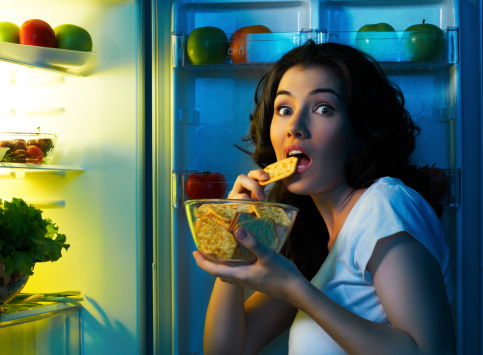
Nix Nocturnal Nibbling For Weight Loss
February 24, 2023 Ashley 0 Comments
You may know that eating from 4 A.M. to 6 A.M. is bad for metabolism.
And you may know that you need enough time between supper and sleep for an optimal slumber. You’ve probably even learned about the benefits of intermittent fasting. However, when it comes to timing and food, there’s something all these things have in common. And it may be the same reason why intermittent fasters choose a window that specifically disallows food after 8 P.M. too. (I know, right? All these limitations!) But there’s a reason for it. Much like the saying that “nothing good happens after midnight”, after 8 P.M., we tend make poor quality and quantity food choices. (In other words, we eat foods that are bad for us and we have too much of it as well.) Okay, but why? Can’t we just practice restraint? Well, we can certainly try. But that still won’t fix the issue. Research has shown that late night munching correlates with an increase in risk for obesity, a rise in overall body fat, and stymied success with weight loss. And, sure, some of it has to do with aforementioned willpower, but not all of it…
First, we will attack that willpower bit, though.
Simply put, as the day goes on, we get more tired. When that point arrives, our hunger hormones, grehlin and leptin (which actually even sound like mischievous prankser goblins), start to troll us. Leptin (the “you’re full” hormone) lowers and grehlin (the “you’re starving” hormone) rises. At this point, we feel almost powerless over our desire to eat. We’re being puppeteered by our own internal chemicals. Worse yet, the first things we want to reach for are all the things we know we should avoid (like fried food, starchy carbs, and sugar). Recent research shows that this is due to how sleep deprivation alters brain function, which in turn alters our sense of smell and, thus, cravings.

Okay, but – again – can’t we just power through the cravings?
Maybe we can first thing in the morning. But, as one theory suggests, willpower is finite. From the moment we wake up, we’re slowly wasting it away with every decision that fatigues us out and every difficult choice we make. Think about how many things you do that you don’t want to do each morning. Not hitting snooze. Doing your morning workout. Taking the dog out in 20 degree cold. Sitting in traffic. Doing those extra tasks your colleagues fail to do at work so you have to pick up the slack. Surviving those full eight hours. Having to pretend to be nice and normal the whole time you’re there. It even sounds exhausting, doesn’t it? By the time nighttime rolls around, all that cumulative use of our willpower battery life would be bad enough. Add onto that the hormonal hijacking that happens naturally- and abstaining from cravings suddenly looks a lot different.
Next up is another common culprit. It doesn’t apply to all of us, mind you; but a great many (me included) are guilty of indulging. And that’s caffeine. Right now, you’re probably thinking, “But caffeine is a stimulant!” While that’s definitely true, so is something else: the fact that what goes up must come down. If you rely on caffeine to get you through your workday, you’re probably moving and shaking for several hours with a stifled appetite. You’re not thinking of food. You’re not craving food. Your 9 A.M. espresso is still going strong. But as soon as you get home and those levels begin to wane… those cravings come crashing down around you. Suddenly, you’re eating everything in view but the wallpaper.

Then, finally, is something we touched on recently on our sister sleep site: digestion.
This one has less to do with willpower and more to do with why late night eating interferes with weight loss. Sleep may not look like a super involved activity. But our bodies indeed go to work when we sleep; it’s a whole process where repair ensues as we rest. Digestion is a process in and of itself. When we eat to close to bed time, neither process gets the quality spotlight it needs to really run smoothly. The result? Both suffer, we don’t sleep well, we don’t metabolize our food well, and we gain weight. We gain weight on the other end as well when we wake up hungry from sleeping poorly – and those hormones are thrown off yet again, making us crave bad stuff. The cycle continues and… bam. Weight gain.
So, if you’re looking to nix another bad habit that’s blocking your weight loss, eliminate late night nibbles!